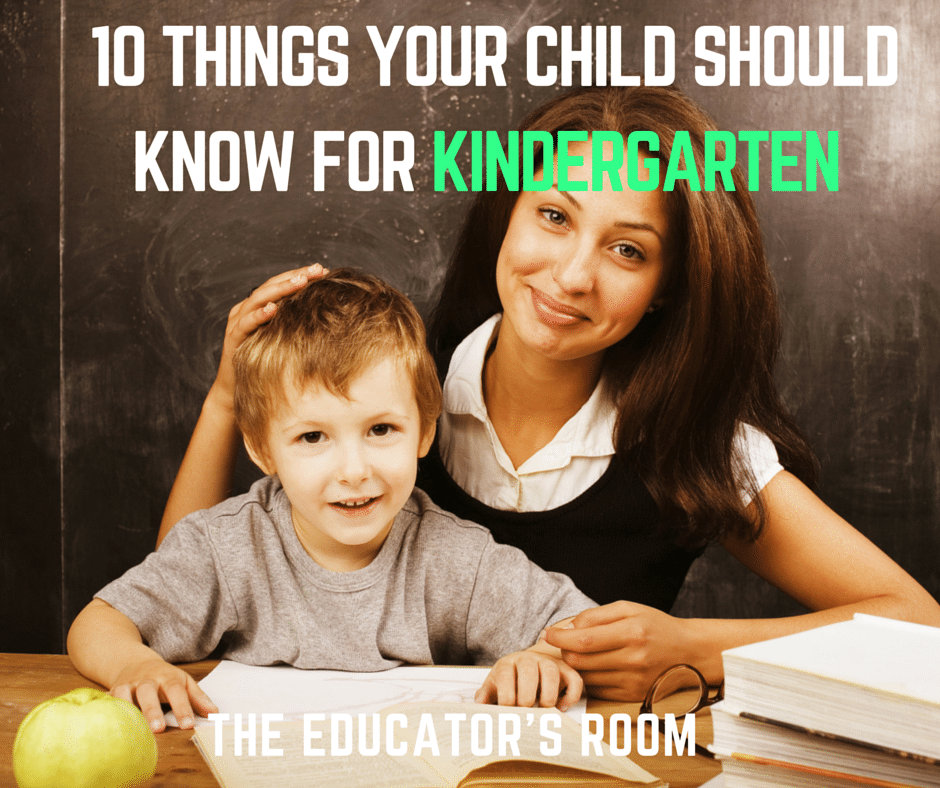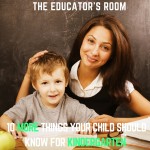It’s almost Kindergarten readiness screening time for my school, and it is exciting to see the new faces that will walk through our doors come September. But it can also be a very frustrating time for Kindergarten teachers because it seems that our little angels with their shining eyes enter with an ever-shrinking knowledge base.
From a Kindergarten Literacy Specialist, here are 10 things we hope every child knows when they start Kindergarten.
1. Basic Personal Information
A child should know what their full name sounds like and looks like. Several years ago, I had a little Kindergarten girl who cried for the entire first month of the school year because she insisted her real name was “Squishy”. I assure you it was not. It’s just as important that your child knows what his/her name looks like in print. It can be a little scary for a 5-year-old on the first day of school when they cannot find their locker or cubby or seat because they have never seen their name in print before.
**BONUS** Teachers love when Kindergartners know their address, phone number, and birthdate. We love it even more when they know mom and dad’s real names.
2. How To Hold and Use a Pencil, Scissors, Glue, Crayons, Etc.
You might be thinking this is not an academic skill, but you would be wrong! We start the children out on the very first day of school with drawing and storytelling. These are important pre-writing skills that we build upon as the school year goes on.
I know it can be messy and inconvenient to have your child have free reign of the art supplies at home. But it not only stimulates their creativity, it helps build important small motor skills. You should be looking for a tripod grasp when they hold a writing utensil. They should not be holding a pencil like a club or a weapon!
And please let your children practice using scissors and glue. A part of our school readiness assessment has the children cut out different shapes with straight lines and curved lines. Once I gave a boy a pair of child’s scissors, and he looked at them like an alien object. When I conferenced with mom and expressed my concern, she sheepishly admitted to me that they did not let him use scissors. In the whole 5 years of his young life, this child had never seen or touched scissors before.
3. Logical Reasoning Skills
This may sound like a very grown-up attribute, but at the very core, it’s the age-old “square peg-round hole” problem. Is your child able to put a small jigsaw puzzle together? Can they put three events in sequential order? When a child has to figure out to turn a puzzle piece around in order for it to fit, it teaches them valuable problem-solving skills.
4. Alphabet
And I don’t just mean the traditional alphabet song. Too many parents think their child “knows” the alphabet because they can sing the song. Wrong. Because even when the teacher mixes up the letter order, the kid is still singing like nothing has changed.
As teachers, we don’t even need the children to know all the upper and lowercase letters. If they can at the very least identify the letters in their own name and a few extras, we’re pretty happy with that.
5. How to Hold a Book
Emilie Buchwald once said, “Children are made readers on the laps of their parents.” The absolute best thing you can do to prepare your child for Kindergarten is to read to them. Turn off the television, turn off the smartphone, turn off the tablets and iPads. Go ahead, I’ll wait.
Now, open a book. Just by reading a book to your child, you turn on their imagination, introduce a variety of new vocabulary, and gain a special moment just for the two of you that can never be replaced.
6. Rhyming
Remember when you were little and mom or grandma sang nursery rhymes with you? You didn’t realize at the time that by reciting nursery rhymes, you were building an innate ability to rhyme. And the ability to recognize and produce rhyming words is a critical early reading skill. Granny knew what she was doing!
So few children know or recite traditional nursery rhymes anymore. Learning nursery rhymes helps little brains develop more than the ability to rhyme. They also teach rhythm, alliteration, and imagery. Score one point for Mother Goose!
7. Numbers
Children should come to school being able to visually identify numbers 1-10 and count up to 20 without skipping numbers. But even more important is to teach children “number sense”. Number sense refers to the intuitive understanding that numbers are a symbolic representation. For a Kindergartner, this might mean they have 1:1 correspondence by being able to touch and count a group of objects. It also means they can look at two groups of objects and pick out which group has more or fewer objects without counting. These skills will help your child down the line with more complex mathematical ideas, such as addition and subtraction.
8. Shapes
Let’s start with the four basic shapes – circle, square, triangle, rectangle. For a 5-year-old brain, it’s tricky enough to tell the difference between square and rectangle. But if you want to impress a Kindergarten teacher, you can throw oval and diamond into the mix. If you really want to impress a Kindergarten teacher, teach your child the “big kid” word for diamond – rhombus.
9. Colors
Remember learning Roy G. Biv? Kindergarten teachers will kindly accept “purple” in place of indigo and violet. And don’t forget the other common colors – white, black, pink, brown, and gray. Gray seems to be a tough one for children to identify; they almost always end up calling it silver.
10. Handwriting
This goes hand-in-hand (pun intended) with #2. Find out whether your school teaches Zaner-Bloser or D’Nealian style and practice this at home. Teach your child that letters and numbers are written from top to bottom and left to right. So many little ones come to school with bad handwriting habits already ingrained in them from the last 5 years of their life. It’s very hard to re-teach handwriting so that it’s legible. You can print worksheets from the internet that have the arrows showing the order and direction for the different handwriting strokes.
**BONUS** If you want your child’s Kindergarten teacher to love you, teach your child to begin their name with an uppercase letter but the other letters are lowercase. Yes, writing in all uppercase letters is easier to learn, but it’s another habit that is difficult for them to forget!
It’s easy for a parent to feel like they are not doing enough to prepare their child for the rigorous Kindergarten Common Core standards. But most children will pick up the academic pieces they need fairly quickly once they enter the classroom environment. If you give them the basics, your child feel more comfortable and confident from the very first day of school.
Next week, I’ll explore the non-academic skills that will prepare your child to enter Kindergarten.
Editor’s Note: If you enjoyed this article, please become a Patreon supporter by clicking here.






I don’t want my child’s Kindergarten teacher to “love me.” I want him or her to understand enough about child developmental to NOT expect all children to be able to know letters and numbers to make their teaching lives easier. I DON’T want him or her to “teach” my child to read or calculate. I want him or her to understand that children learn through play…through interacting with an enriched environment. I want him or her to understand that reading at age 4 does NOT make a child “smarter” than one who waits until age 7…or even age 9! If I were a Kindergarten teachers, I would hope that the children coming into my learning environment would have an opportunity to learn social skills by interacting with other children in free play situations. That the children would have learned empathy through that interaction. And yes, I would hope that the parents of those children would have read to them A LOT without any pressure to learn to read…or to write. Certainly, if they showed interest in learning to read or write or draw numbers, they should be given every opportunity. But as teacher, I would NOT want them to have been pressured to learning something for which they were not developmentally ready, or in which they were not interested.
Although the author states that this is the expectation, it’s really the expectation of the educational system and has nothing to do with what the kindergarten teacher thinks is appropriate. Children who come in without the above mentioned skills are considered to be behind developmentally now under the new education standards. I am not happy about them either because despite 2 years of kindergarten, lots of practice at home and parents who are teachers, my daughter still doesn’t have some of these skills. But we will make it work anyway.
Modern Educational System has made it hard for some kids to cope up. But I agree that kids should learn these stuff before Kindergarten. We have to understand as well that some children are late when it comes to development and we have to be extra gentle in teaching them.